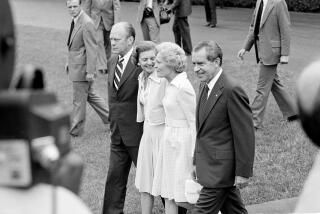Michael S. Joyce, 63; Key Player in Rise of Conservatism in 1990s
- Share via
WASHINGTON — Michael S. Joyce, who as president of the Bradley Foundation played a central role in the rise of the conservative political agenda during the 1990s, died of liver disease Feb. 24 at a healthcare facility in Wisconsin. He was 63.
Called “the godfather of modern philanthropy” by neoconservative thinker Irving Kristol and the “chief operating officer of the conservative movement” by National Review magazine, Joyce distributed millions of dollars building the modern network of conservative groups that waged what he termed a “war of ideas.”
“My style was the style of the toddler and the adolescent: Fight, fight, fight, rest, get up, fight, fight, fight,” he told the Milwaukee Journal Sentinel in 2001. “No one ever accused me of being pleasant. I made a difference. It was acknowledged by friend and foe.”
During the 15 years that Joyce was its president, the Milwaukee-based foundation gave away more than $280 million, paying for the legal battle that expanded that city’s private-school voucher program to religious schools and underwriting hundreds of scholarships while the program was challenged in the courts. He was a central figure in Wisconsin’s welfare reform movement in the early 1990s, which forced thousands of residents off welfare rolls. Both programs still serve as national models for conservatives interested in using market forces to alter government policies.
Joyce was also widely credited with developing the intellectual framework for President Bush’s agenda on faith-based initiatives.
At the behest of Bush and senior advisor Karl Rove in 2001, Joyce created Americans for Community and Faith-Centered Enterprise. He also set up a similarly named nonprofit educational foundation, based in Phoenix, to advocate for faith-based groups.
“For a lot of people, this conjures images of serpent handlers and speaking in tongues,” Joyce said at the time. “We’re busy convincing centrist Democrats that allowing equal access to public resources is not establishing a religion.”
He was on the Reagan transition team in 1980, advised President Bush and his father, and in 1993 helped establish the Project for the Republican Future, which developed strategies to help the GOP recapture Congress and the presidency.
The Chicago Tribune described Joyce in 1993 as “compact, bespectacled ... more a mild-mannered professor than a political and intellectual intriguer.” He was interested in funding what he called “new citizenship” and the “empowerment” of traditional local institutions such as families, schools, churches and neighborhoods.
He joined the Lynde and Harry Bradley Foundation in 1985, just as it became one of the wealthiest philanthropies in the country. In 2004, it was the 51st-biggest foundation, in terms of its $647 million in assets, according to the Chronicle of Philanthropy. It made $33 million in grants that year.
Born in Cleveland to a middle-class family active in local politics, Joyce graduated from Cleveland State University in 1967 and taught for several years at two Catholic high schools in the area. In 1968, he worked at the Educational Research Council of America, which produced textbooks. He later earned a doctoral degree in education from Walden University, an online school based in Naples, Fla.
In 1975, he was named to run the Goldseker Foundation in Baltimore and three years later led the New York-based Institute for Educational Affairs. By 1979, Joyce was executive director of the John M. Olin Foundation, one of the early conservative foundations. He served in that post until moving to the Bradley Foundation.
Survivors include his wife of 17 years, Mary Jo Repinski Joyce of West Bend, Wis.; a son and daughter from his first marriage, which ended in divorce; a stepdaughter; two brothers; and a sister.
More to Read
Sign up for Essential California
The most important California stories and recommendations in your inbox every morning.
You may occasionally receive promotional content from the Los Angeles Times.













